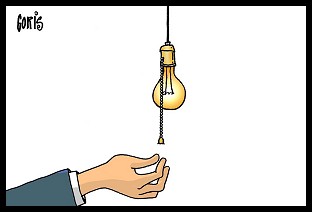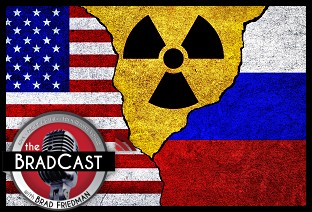We've been updating this item all day and night --- having started the earlier this afternoon --- as events have developed...See bottom for latest updates through the EXPLOSION which has 3/12/11 1am PT.
We are now moving the UPDATES as of the EXPLOSION to a new item here...
 This now deserves its own item --- as I've feared it has since last night's cryptic official comments --- so I've broken off the UPDATES from the previous item, concerning the nuclear emergency declared at Fukushima in the wake of last night's earthquake and tsunami in Japan to this item, dedicated to the nuke issues.
This now deserves its own item --- as I've feared it has since last night's cryptic official comments --- so I've broken off the UPDATES from the previous item, concerning the nuclear emergency declared at Fukushima in the wake of last night's earthquake and tsunami in Japan to this item, dedicated to the nuke issues.
We asked, snarkily, at the end of the original item earlier today: "Nuclear Energy for America: What Could Possibly Go Wrong?"
We may be learning exactly that tonight, as radiation levels are reported to be 1000 times normal levels; "emergency" declarations now exist for two plants --- Fukushima Daiichi plant on east coast, 200 miles north of Tokyo and the Fukushima Daiichi complex --- with a total of five reactors said to be at risk; evacuations around the plants have been expanded to 10km; and, as one of the experts has said (and several others have concurred), "the possibility of some sort of core meltdown" exists.
If there was nothing to worry about here, it seems that officials would be saying that over and over. They are not.
So, the original UPDATES to the earlier item, and the additional ones we've added throughout the day, all follow below --- with new UPDATES, and what seems to be the increasingly bad news, including two nuclear experts who have just appeared on Rachel Maddow moments ago saying the more they hear, the less assured they are that things are safe --- all added to the bottom of the article, where we'll continue to update as warranted.
We're also continue to tweet quick updates and links via: @TheBradBlog.
UPDATE 12:41pm PT: More details here on the "Nuclear Crisis at Fukushima". The article is already outdated, however, as the 2km evacuation has just now been expanded to 10km by the Japanese Prime Minister, according to tweets from VOA's Asian Bureau Chief Steve Herman who adds: "Officials now saying radiation at Fukushima nuke plant 1,000X normal level." (BBC report on levels.)
Herman adds Kyodo is reporting "This suggests radioactive steam could spread around the facility."
Really not good.
UPDATE: 2:41pm PT: CNN has an update now, including an expert who says, "If they can't restore power to the plant (and cool the reactor), then there's the possibility of some sort of core meltdown."
Key excerpts now follow below...
Citing the Tokyo Electric Power Co., Japan's Kyodo News Agency said that radioactive substances may have seeped out of the Fukushima Daiichi nuclear reactor, about 160 miles (260 kilometers) north of Tokyo. Earlier, the agency had reported that authorities may purposefully release radioactive vapor to alleviate pressure at the power plant.
Radiation levels measured at a monitoring post near the plant's main gate are more than eight times above normal, Japan's nuclear safety agency said, according to Kyodo.
...
Most of the concern has centered around the Fukushima Daiichi nuclear reactor, which Chief Cabinet Secretary Yukio Edano told reporters on Friday "remains at a high temperature" because it "cannot cool down."
...
The company said that it plans to take steps to "reduce the pressure of the reactor."
...
The government said earlier that it was sending senior officials and the defense force's Chemical Corps to the Fukushima power plant, according to the Kyodo News Agency.
The same agency later reported that authorities may release some radioactive steam in order to alleviate pressure at the reactor.
The IAEA, the international nuclear organization, said Friday that its officials are "in full response mode," as they worked with Japanese authorities and monitor the situation.
Using Air Force planes, the U.S. government has sent over coolant for the Fukushima plant, Secretary of State Hillary Clinton said Friday.
...
James Acton, a physicist who examined the Kashiwazaki-Kariwa plant after a 2007 earthquake, told CNN that Japanese authorities are in a race to cool down the Fukushima reactor.
"If they can't restore power to the plant (and cool the reactor), then there's the possibility of some sort of core meltdown," he said.
 UPDATE 5:41pm PT: Earlier today from LATimes...
UPDATE 5:41pm PT: Earlier today from LATimes...
The news doesn't seem any better from USAToday late tonight...
The Japanese government on Friday declared a nuclear emergency at Tokyo Electric Power's Fukushima Daiichi nuclear power station after the reactor's cooling system failed. The government ordered thousands of people living within 6 miles of the plant to evacuate. Early Saturday, it declared a nuclear emergency at a second power plant where a cooling system had also failed.
"It has the potential to be catastrophic," said Robert Alvarez, a senior scholar at the Institute for Policy Studies in Washington, and a former senior policy adviser to the Energy Secretary during the Clinton administration.
...
Chief Cabinet Secretary Yukio Edano said the amount of radioactivity in vapor would be "very small" and would not harm people or the environment.
"With evacuation in place and the ocean-bound wind, we can ensure the safety," he said at a news conference early Saturday.
The venting may relieve some pressure and give workers more time to restore the emergency cooling systems. They have a 12- to 24-hour window, Alvarez said.
"I don't think the venting is going to result in a catastrophic release, but it's definitely an indication that all is not well there," he said.
If the cooling is not restored quickly, the core can overheat, causing the water to boil over and exposing the core to air. The interior can catch fire and cause a meltdown, releasing nuclear material into the concrete containment dome that surrounds the reactor, Alvarez says.
"Is this barrier going to be sufficient?" Alvarez said. "It's a dicey proposition. The best you can say is, stay tuned."
If they re-establish a stable power supply and restore the cooling, "We should all breathe a sigh of relief," Alvarez said. "If they can't, it's very serious."
5:58pm PT: From AP...
Operators at the Fukushima Daiichi plant's Unit 1 scrambled ferociously to tamp down heat and pressure inside the reactor after the 8.9 magnitude quake and the tsunami that followed cut off electricity to the site and disabled emergency generators, knocking out the main cooling system.
Some 3,000 people within two miles (three kilometers) of the plant were urged to leave their homes, but the evacuation zone was more than tripled to 6.2 miles (10 kilometers) after authorities detected eight times the normal radiation levels outside the facility and 1,000 times normal inside Unit 1's control room.
The government declared a state of emergency at the Daiichi unit - the first at a nuclear plant in Japan's history. But hours later, the Tokyo Electric Power Co., which operates the six-reactor Daiichi site, announced that it had lost cooling ability at a second reactor there and three units at its nearby Fukushima Daini site.
The government quickly declared states of emergency for those units, too, and thousands of residents near Fukushima Daini also were told to leave.
...
Despite plans for the intentional release of radioactivity, Chief Cabinet Secretary Yukio Edano said the 40-year-old plant was not leaking radiation.
"With evacuation in place and the ocean-bound wind, we can ensure the safety," Edano said at a televised news conference early Saturday.
It was unclear if the elevation of radioactivity around the reactor was known at the time he spoke.
...
Dr. Irwin Redlener, a pediatrician who runs a disaster preparedness institute at Columbia University, said the reported level of radiation outside the plant would not pose an immediate danger, though it could lift the rate of thyroid cancer in a population over time.
However, he called the reported level inside the plant extraordinarily high, raising a concern about acute health effects. "I would personally absolutely not want to be inside," he said.
...
Technical experts said the plant would presumably have hours, but probably not days, to try to stabilize things.
...
It also was not immediately clear how closely the reactor had moved toward dangerous pressure or temperature levels. If temperatures were to keep rising to more than 2,000 degrees Fahrenheit, it could set off a chemical reaction that begins to embrittle the metallic zirconium that sheathes the radioactive uranium fuel.
That reaction releases hydrogen, which can explode when cooling water finally floods back into the reactor. That was also concern for a time during the 1979 Three Mile Island accident in Pennsylvania.
If the reactor temperature keeps reaches around 4,000 degrees, the fuel could melt outright, and the reactor could slump right into the bottom of the containment building in a partial meltdown. Then the crucial question would be whether the building would stay intact.
"The last line of defense is that containment - and that's got to hold," Gundersen said. If it doesn't, the radioactive load inside the reactor can pour out into the surroundings.
...
As one of the most seismically active countries in the world, Japan has strict sets of regulations designed to limit the impact of quakes on nuclear power plants. These standards call for building plants on solid bedrock to reduce shaking.
Even so, 10 of Japan's 54 commercial reactors were shut down because of the quake, and Tokyo Electric Power said it had to reduce power generation. Japan gets about 30 percent of its electricity from nuclear power.
One, perhaps, "positive" point in the AP article: "Mobile electricity supplies" have arrived at the Daiichi plant. Electricity, they say, it's what's needed now to cool down the reactors, presuming it's not too late.
And on Rachel Maddow just now, an expert concurred that he is feeling less good about the situation, the more that he is hearing about it...
6:42pm PT: Another expert on Maddow, Joe Cirincione of Ploughshares Fund, says: "We have never seen something like this. We have never seen multiple reactors at risk. ... This could be a technological catastrophe."
7:23pm PT: Reuters via Twitter: "FLASH: Japan PM says minute amounts of radiation released from Fukushima plant: Kyodo" --- "Minute", eh?...
7:31pm PT: Washington Post confirms "state of emergency...for five nuclear reactors at two quake-struck power plants as military and utility officials scrambled to tame rising pressure and radioactivity levels inside the units and stabilize the facilities used to cool the plants' hot reactor cores."
They also present some conflicting info to previous reports of restored electricity: "The utility said it had restored power from the grid, but the IAEA said power was restored from 'mobile electricity supplies.'"
Doesn't instill confidence, frankly.
7:55pm PT: Leak confirmed. Story posted at CNN minutes ago...
Atomic material has seeped out of one of the Fukushima Daiichi plant's five nuclear reactors, about 160 miles (260 kilometers) north of Tokyo, said Kazuo Kodama, a spokesman for Japan's nuclear regulatory agency.
9:07pm PT: Most recent announcement from IAEA on Fukushima is now 7 hours old. No newer news on 5 nuclear reactor emergencies, IAEA???
9:21pm PT: Oy. Reuters via Twitter: "FLASH: #Japan nuclear authorities say high possibility of meltdown at Fukushima Daiichi No. 1 reactor - Jiji"
9:31pm PT: AP's Tomoko Hosaka confirms: "Japan nuclear safety commission official says meltdown at nuclear power plant possible"
9:37pm PT: Looks like it's either about to meltdown, or already is doing so...
TimeOutTokyo from Kyodo: "Reports coming in: cesium detected around the nuclear reactor 1 (Fukushima), which is one of the elements that gets released in a meltdown"
Asia editor of The Times, Richard Lloyd Parry via Twitter:: "Nuclear expert tells The Times: meltdown has technically begun at Fukushima." ... "Fukushima fel cores are melting at 2000C and dropping onto steel floor. Steel melts at 1500C. Could still be brought under control, but ... Four other Fukushima nuke reactors are struggling with similar problem. If multiple meltdown begins, it will be uncontrollable."
9:47pm PT: More from The Times editor's Twitter feed: "Japan faces serious chance of nuclear disaster to rival Three Mile Island. At least, J nuke program is set back years, possibly scuttled." ... "If there is full scale Fukushima meltdown current evac zone 10km is inadequate. 30km at least needed."
VOA's Steve Herman has somewhat (?) conflicting report from AP: "AP quotes experts saying if nuke meltdown, risk zone is 6km radius."
9:53pm PT: From bad to worse, it looks like. This from NHK World (via Rachel Maddow):
The operation at Fukushima No.1 plant to lower pressure of the containment vessel has been suspended due to high radiation levels at the site.
Pressure of the reactor container is rising as its cooling system became dysfunctional due to a blackout and power generator breakdown. This has raised concern about possible damage to the container.
The power station's operator, Tokyo Electric Power Company, began to vent air from the reactor container at 9AM on Saturday.
Under the plan, 2 valves close to the container would be opened manually, but radiation level on the second valve was found higher than expected.
The operation has been suspended because of the possibility that workers could be exposed to radiation. The utility is reportedly studying how to open the valve by replacing workers at a short interval, or using electric remote control.
The Nuclear and Industrial Safety Agency says if radioactive substance is released in the air, safety of residents evacuated beyond a 10-kilometer radius from the No.1 reactor will be ensured.
Saturday, March 12, 2011 13:09 +0900 (JST)
10:01pm PT: Some not as bad news? Richard Lloyd Parry of The Times again: "Another expert on NHK counsels caution, says Fukushima partial nuke meltdown is controllable, current evacuation zone is adequate."
REMINDER: I'm able to cover more, quickly via Twitter. Follow here if you wish: @TheBradBlog.
10:21pm PT: From NBC...
Ryohei Shiomi said Saturday that officials were checking whether a meltdown had taken place at the Fukushima Daiichi power plant, which had lost cooling ability in the aftermath of Friday's powerful earthquake.
Shiomi said that even if there was a meltdown, it wouldn't affect humans outside a six-mile (10-kilometer) radius.
10:46pm PT: IAEA finally offers fresh update. First in eight hours or so. Not much new info there, however, it seems.
11:00pm PT: Meltdown politics. As the discussion has come up in comments here, Reuters just in with this: "Analysis: Nuclear power growth at risk if Japan plant leaks"
11:26pm PT: CNN reports on air: "Japanese nuclear power spokesman says small amount of cesium leaked into air around plant. Strong possibility it was caused by the melting of a fuel rod."
11:34pm PT: Must stand down for the night (though may be able to tweet a bit longer at @TheBradBlog). Recommend you follow Steve Herman (@W7VOA), Voice of America's Asian editor, whose just landed at Fukushima. He should have key reports from on the ground there.
We'll be back as soon as possible...hopefully after some sleep. Stay safe, Japan.
* * * EXPLOSION * * *
* * *
UPDATE: 3/12 2:58am PT: As of the EXPLOSION, we are moving all new UPDATES to this new item...


 Court Blocks Hegseth Censure of Sen. Mark Kelly
Court Blocks Hegseth Censure of Sen. Mark Kelly Harpy Tantrums, Legal Losses, Election Fails, Retreating ICE and Other Hopeful Signs: 'BradCast' 2/12/26
Harpy Tantrums, Legal Losses, Election Fails, Retreating ICE and Other Hopeful Signs: 'BradCast' 2/12/26 'Green News Report' 2/12/26
'Green News Report' 2/12/26
 'Let Kids with Asthma Suffer': Trump to Reverse EPA's Landmark 'Endangerment Finding': 'BradCast' 2/11/26
'Let Kids with Asthma Suffer': Trump to Reverse EPA's Landmark 'Endangerment Finding': 'BradCast' 2/11/26 Trump's Presidency Now About Little More Than Racism, Corruption, Culture War Nonsense: 'BradCast' 2/10/26
Trump's Presidency Now About Little More Than Racism, Corruption, Culture War Nonsense: 'BradCast' 2/10/26 'Green News Report' 2/10/26
'Green News Report' 2/10/26 About Trump's FBI Raid of the Fulton County, GA Elections Warehouse: 'BradCast' 2/9/26
About Trump's FBI Raid of the Fulton County, GA Elections Warehouse: 'BradCast' 2/9/26 Sunday 'Dead in Darkness' Toons
Sunday 'Dead in Darkness' Toons 'New START' Treaty Allowed to End Amid New World Disorder: 'BradCast' 2/5/26
'New START' Treaty Allowed to End Amid New World Disorder: 'BradCast' 2/5/26 'Green News Report' 2/5/26
'Green News Report' 2/5/26 Trump Turns 'War on Terror' Tools Against Domestic Political Foes: 'BradCast' 2/4/26
Trump Turns 'War on Terror' Tools Against Domestic Political Foes: 'BradCast' 2/4/26 Losing Legally and Politically, Trump Threatens to 'Nationalize' Elections: 'BradCast' 2/3/26
Losing Legally and Politically, Trump Threatens to 'Nationalize' Elections: 'BradCast' 2/3/26 'Green News Report' 2/3/26
'Green News Report' 2/3/26 Bad and Good Bunnies, and an Electoral Shock in Deep 'Red' TX: 'BradCast' 2/2/26
Bad and Good Bunnies, and an Electoral Shock in Deep 'Red' TX: 'BradCast' 2/2/26 Sunday 'Mirror, Mirror' Toons
Sunday 'Mirror, Mirror' Toons 'Green News Report' 1/29/26
'Green News Report' 1/29/26 It's About Elections and the Windmills of His Mind: 'BradCast' 1/29/26
It's About Elections and the Windmills of His Mind: 'BradCast' 1/29/26 Govt Shutdown Over ICE Funding Near Certain This Weekend: 'BradCast' 1/28/26
Govt Shutdown Over ICE Funding Near Certain This Weekend: 'BradCast' 1/28/26 Trump Blinks, Bovino Out, MN Op Falters, Persists as Midterms Loom: 'BradCast' 1/27
Trump Blinks, Bovino Out, MN Op Falters, Persists as Midterms Loom: 'BradCast' 1/27  The ICE Murder of ICU Nurse Alex Pretti and the Heroes of Mpls: 'BradCast' 1/26/26
The ICE Murder of ICU Nurse Alex Pretti and the Heroes of Mpls: 'BradCast' 1/26/26  The BRAD BLOG: 22 Years and Still Counting
The BRAD BLOG: 22 Years and Still Counting Mr. Smith Testifies (Publicly) in Washington: 'BradCast' 1/22/26
Mr. Smith Testifies (Publicly) in Washington: 'BradCast' 1/22/26 World Turning Against Self-Destructing U.S. Under Trump: 'BradCast' 1/21/26
World Turning Against Self-Destructing U.S. Under Trump: 'BradCast' 1/21/26 Trump Waste, Fraud, Abuse on Voting, at DOJ, by DOGE: 'BradCast' 1/20/26
Trump Waste, Fraud, Abuse on Voting, at DOJ, by DOGE: 'BradCast' 1/20/26
 VA GOP VOTER REG FRAUDSTER OFF HOOK
VA GOP VOTER REG FRAUDSTER OFF HOOK Criminal GOP Voter Registration Fraud Probe Expanding in VA
Criminal GOP Voter Registration Fraud Probe Expanding in VA DOJ PROBE SOUGHT AFTER VA ARREST
DOJ PROBE SOUGHT AFTER VA ARREST Arrest in VA: GOP Voter Reg Scandal Widens
Arrest in VA: GOP Voter Reg Scandal Widens ALL TOGETHER: ROVE, SPROUL, KOCHS, RNC
ALL TOGETHER: ROVE, SPROUL, KOCHS, RNC LATimes: RNC's 'Fired' Sproul Working for Repubs in 'as Many as 30 States'
LATimes: RNC's 'Fired' Sproul Working for Repubs in 'as Many as 30 States' 'Fired' Sproul Group 'Cloned', Still Working for Republicans in At Least 10 States
'Fired' Sproul Group 'Cloned', Still Working for Republicans in At Least 10 States FINALLY: FOX ON GOP REG FRAUD SCANDAL
FINALLY: FOX ON GOP REG FRAUD SCANDAL COLORADO FOLLOWS FLORIDA WITH GOP CRIMINAL INVESTIGATION
COLORADO FOLLOWS FLORIDA WITH GOP CRIMINAL INVESTIGATION CRIMINAL PROBE LAUNCHED INTO GOP VOTER REGISTRATION FRAUD SCANDAL IN FL
CRIMINAL PROBE LAUNCHED INTO GOP VOTER REGISTRATION FRAUD SCANDAL IN FL Brad Breaks PA Photo ID & GOP Registration Fraud Scandal News on Hartmann TV
Brad Breaks PA Photo ID & GOP Registration Fraud Scandal News on Hartmann TV  CAUGHT ON TAPE: COORDINATED NATIONWIDE GOP VOTER REG SCAM
CAUGHT ON TAPE: COORDINATED NATIONWIDE GOP VOTER REG SCAM CRIMINAL ELECTION FRAUD COMPLAINT FILED AGAINST GOP 'FRAUD' FIRM
CRIMINAL ELECTION FRAUD COMPLAINT FILED AGAINST GOP 'FRAUD' FIRM RICK SCOTT GETS ROLLED IN GOP REGISTRATION FRAUD SCANDAL
RICK SCOTT GETS ROLLED IN GOP REGISTRATION FRAUD SCANDAL VIDEO: Brad Breaks GOP Reg Fraud Scandal on Hartmann TV
VIDEO: Brad Breaks GOP Reg Fraud Scandal on Hartmann TV RNC FIRES NATIONAL VOTER REGISTRATION FIRM FOR FRAUD
RNC FIRES NATIONAL VOTER REGISTRATION FIRM FOR FRAUD EXCLUSIVE: Intvw w/ FL Official Who First Discovered GOP Reg Fraud
EXCLUSIVE: Intvw w/ FL Official Who First Discovered GOP Reg Fraud GOP REGISTRATION FRAUD FOUND IN FL
GOP REGISTRATION FRAUD FOUND IN FL

































